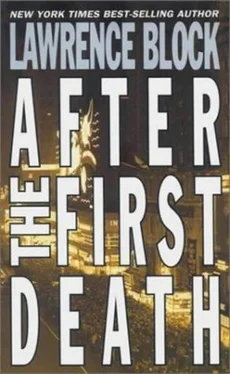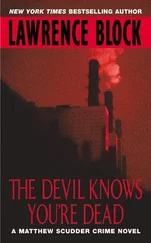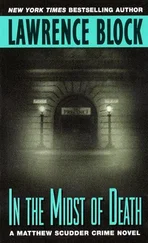The New York Public Library showed me Russell J. Stone’s face. There is a magazine, I discovered, called Purchasing World, a trade journal which is evidently of some interest to purchasing agents. According to my once-wife, Stone had been promoted to his present position a bit over three years ago, so I went through a stack of issues of that vintage looking for the story that would inevitably accompany such a promotion.
Patient plodding is the cornerstone of historical research. I made my boring way through the stack of issues until I finally found the article. They had given him most of a column, and there was a good head-and-shoulders shot of him, lips smiling bravely, eyes frank and open, hair neatly combed and parted. He looked like a large man, a beef and bourbon type, a little older than me, a good bit wealthier than me, a far sight more successful than me in almost every respect. Gwen, I thought, had stepped up nicely, had made a good exchange.
I read the article. There was a boring lot on what his new duties would include, and what his old duties had included, and then there was the biography of our hero, the college he went to, the fraternity, the honors, the first jobs, all the grand and glorious steps he had climbed en route to the pinnacle of success he presently occupied, purchasing director for Interpublic Chemical.
He was an Indianan, a Purdue graduate. He worked first in Pittsburgh, then for a long stretch in Chicago, and finally in California. And, almost completely hidden in the list of jobs, there was the information that he had been on special assignment for his Chicago employers for the better part of a year, the very year Evangeline Grant was murdered and Alexander Penn saddled with her murder.
Special assignment in their New York office.
I ripped that page out of Purchasing World, feeling as I did so that few persons beside myself were likely to have any great interest in that particular story. I, on the other hand, would want to refer to it from time to time. I had found my man. Now I would have to hang it on him. I wanted to know everything that page could teach me about him. I wanted to stare long and hard at that sleek successful face, and I wanted to coax and prod my memory until I could know where I might have seen that face before.
In my room I drew the blinds and lay on my bed in the darkness. I concentrated on that face, and then I went back to the night when it happened. The arm, the hand, the knife, all of it going for Robin while I lay there, doing nothing. I tried to match a body to that arm and put a face on that body. It seemed as though there was something about that arm that was memorable but I couldn’t focus it in my mind. I invented the right sort of body for an old Purdue football player gone a little bit to fat, and I put that sleek head on top of it, and I fought fiercely to make myself remember having seen it all just that way.
But it wouldn’t work. I could just about convince myself that it had happened that way, but I couldn’t make it interlock with anything that remained in my memory. It was possible, I thought, that with the selective vision of the drunk, I had seen only the arm and the hand and had never seen the killer’s face at all.
If that were the case, teasing my memory would do no good. I could not force myself to recall what I had never seen.
In the darkness, in the quiet, I found myself remembering Sunday morning in the Maxfield Hotel It was now-what? Tuesday, incredibly enough. Tuesday afternoon, late afternoon.
It seemed ages ago.
I let myself remember it, the moment of discovery, all of it. And then there was something that had not bothered me before, but that seemed inconsistent now. When I wrapped myself up in the bedsheet and went down the hall to the bathroom, the door to my room had been locked. Not from the outside-you needed the key to lock that door, and the key had been in the room with me. But the door had been bolted from within, and I had unbolted it before I could leave.
Who could have locked it? Robin? It seemed logical that she would, but I couldn’t remember her doing so. And if she had, how had the killer entered the room?
All right. Suppose, then, that she had not bolted the door. Then whoever killed her had somehow contrived to bolt the door after killing her, and leave without disturbing the lock. It was possible, if there was a fire escape at the window, or a door leading to an adjoining room. But why do it that way? Why not just leave by the regular door?
Of course it made a better frame this way. Finding myself locked in with her, I had to believe that I had killed her myself. But-
There was a sudden flash of horrible doubt, and I threw myself up from the bed and turned on the overhead light, unwilling to be alone in the darkness with the horrible feeling of dread.
Because-
Because suppose the memory of that arm and hand were a false memory, a schizoid separation of self from self. Suppose, then, that a part of my mind had chosen to see myself kill Robin and view it as the act of another man. Suppose-
No.
I was not going to let it be that way. No.
I CALLED GWEN ON TUESDAY MORNING. BY WEDNESDAY NIGHT I was so profoundly awash in a sea of lists and phone calls and clippings and names that I ached for the dry land of movement and action and contact. I had to find out things about Russell Stone, about Pete Landis, about Warren Hayden. And I had to find out these things without exposing myself, somewhat in the manner of a smoker attempting to light a cigarette from a roaring bonfire. I didn’t dare get close enough to do the job. So far I had not gotten burned, but the cigarette wasn’t lit, either, and its end was not even warm.
Hayden was in Peru. A telephone call to the college confirmed this, he was on sabbatical leave in Peru, he had left months ago, and it would be months before he would return. The airlines which link New York with Lima had no record of a passenger named Warren Hayden within the past month. He could conceivably have slipped away from the lost city of the Incas to fly to New York and back under an assumed name. He could have done this, but I would not make book on it I crossed him off the list.
Pete Landis led me a chase. He wasn’t listed in the phone book at his old address, but there were other P. Landises and Peter Landises scattered throughout the five boroughs, and I wasted dimes calling several of them. I called his old employer and couldn’t get any information about him. He wasn’t with them any more, and they either did not know or would not say where he was now. I called the main office of the New York Stock Exchange on the chance that they might keep track of the whereabouts of various brokers. I talked with a good many secretaries and assistant managerial types and got nowhere.
I called the branch post office in his old neighborhood to see if they had a change of address card on him in the files. They didn’t, so I went to his building on the chance that he and Mary had de-listed their telephone number. They were not living there. I asked the building superintendent if he remembered the Landises, and when they moved. He said he couldn’t keep track of everybody, and that he had only been on this job for a year and a half, and maybe they had moved out before his time. I asked if he could call the landlord and check it out for me. He didn’t know if the landlord would keep records of past tenants. I told him it was worth checking out, and he said he was a busy man and had plenty of things to do.
“I’d appreciate it,” I said.
“Well, it’d take up my time.”
“It’s important to me.”
“Important is important, but time is money.”
I felt exceptionally stupid. It had never occurred to me to bribe the man. I had no idea what might be the proper bribe. I handed him ten dollars, which in retrospect seemed rather high for one phone call. He did not offer to give me change. He went into his apartment and closed the door, leaving me out in the hallway. I heard him dialing the telephone but couldn’t follow his conversation. I had a sudden urge to run, certain that he had recognized me and that he was calling not the landlord but the police. I lit a cigarette and forced myself to stay where I was, and a moment later he returned with an address scrawled on an irregular scrap of brown wrapping paper. They had moved three years ago, the superintendent assured me. I thanked him-why thank him? he was well paid-and left.
Читать дальше












